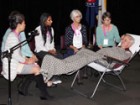Dear Editor: I am responding to the usually conservative Father Pacholczyk’s Feb. 20 column on “Human Organs from Pigs.” I was shocked with his very pro-scientific endorsement of chimeras.
bioethics

Human Organs from Pigs
Human beings can have a visceral reaction to the thought of growing human kidneys or livers inside the bodies of pigs or cows. Although the idea of a chimeric animal is indeed unusual, several factors need to be considered in evaluating the practice of growing human organs within animals.

Human Life Must Be Held to a Higher Standard
SOMETIMES PEOPLE will point out: “We euthanize our pets when they suffer, and they are clearly creatures of God, so why can’t we euthanize a sick and suffering person who wants it? It seems like we treat our dogs and cats better than we treat our suffering family members.” The way we treat animals, however, should not be the measure of how we treat fellow human beings.
End-of-Life Decisions
Dear Editor: Thank you for reporting on “A Catholic Look at End of Life Issues,” (Nov. 12). It is a very important and all too avoided subject. Compassion and Choices (the agency directing the physician-assisted suicide movement) has run a tremendously successful campaign to devalue human life when its truly vulnerable – that is sinful.

Teaching Children the Truths of Human Sexuality
WHILE SOME parents might be happy to avoid the awkward conversations that arise around human sexuality by allowing the school system to provide their children’s sex education, it is nonetheless important for parents to recognize that they are the most significant teachers and models for their own children as they mature sexually.

A Catholic Look at End-of-Life Choices
Having a conversation about end-of-life care is awkward and difficult, but it can help in making decisions about what matters most when the time comes. That was the focus of “Journey to Healing: End of Life Conversations and the Catholic Perspective,” a free conference hosted by Catholic Charities Bereavement Services.

Consenting to the Unconscionable
In recent years, scientists have come to rely on freshly obtained human tissue specimens for research and experimentation. Sometimes these tissues and organs can be obtained after routine surgeries like gall bladder removal from adults or foreskin removal during the circumcision of newborns. The use of such tissues and organs can be morally acceptable if the patient (or parents) provide informed consent. The use of cells and tissues from fetuses can also be morally acceptable when those cells are obtained from a natural miscarriage, and the parents provide consent. This would be equivalent to consenting to an organ donation from their deceased child.

Piecemeal Procreation and Three-Parent Embryos
AN ETHICAL RUBICON was crossed when the first in-vitro fertilization (IVF)-conceived baby came into the world in 1978. With human reproduction no longer limited to the embrace of a man and a woman, people felt empowered to take their own sperm and eggs, or those of others, and create their much desired children bit-by-cellular-bit.

